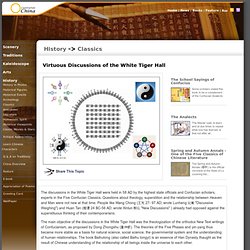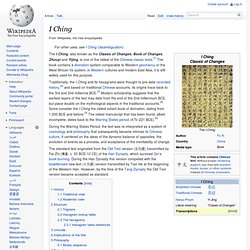

Yijing Dao. Virtuous Discussions of the White Tiger Hall. The discussions in the White Tiger Hall were held in 58 AD by the highest state officials and Confucian scholars, experts in the Five Confucian Classics.

Questions about theology, superstition and the relationship between Heaven and Man were not new at that time. People like Wang Chong (王充 27- 97 AD; wrote Lunheng 论衡 "Discussive Weighing") and Huan Tan (桓谭 24 BC-56 AD; wrote Xinlun 新论 "New Discussions" ) already had opposed against the superstituous thinking of their contemporarians. The main objective of the discussions in the White Tiger Hall was the theologization of the orthodox New Text writings of Confucianism, as proposed by Dong Zhongshu (董仲舒). The theories of the Five Phases and yin-yang thus became more stable as a basis for natural science, social science, the governmental system and the understanding of human relationships.
I Ching. The I Ching, also known as the Classic of Changes, Book of Changes, Zhouyi and Yijing, is one of the oldest of the Chinese classic texts.[1] The book contains a divination system comparable to Western geomancy or the West African Ifá system; in Western cultures and modern East Asia, it is still widely used for this purpose.

Traditionally, the I Ching and its hexagrams were thought to pre-date recorded history,[2] and based on traditional Chinese accounts, its origins trace back to the 3rd and 2nd millennia BCE.[3] Modern scholarship suggests that the earliest layers of the text may date from the end of the 2nd millennium BCE, but place doubts on the mythological aspects in the traditional accounts.[4] Some consider the I Ching the oldest extant book of divination, dating from 1,000 BCE and before.[5] The oldest manuscript that has been found, albeit incomplete, dates back to the Warring States period (475–221 BCE).[6] History[edit] Traditional view[edit]
Free I Ching eBook: Unveiling the mystery of I Ching, also called the Book of Changes, (Yijing or Yi Jing), translated and elaborated by Tuck Chang. Yi Jing, Oracle of the Sun.